If you've read more than a couple articles here on the Natural Dog Blog, then you know that the way that I work with dogs has also had a profound effect on my relationships with people. In fact, along with coaching people with their dogs, I have been coaching people to improve their relationships, and I have also been studying Strategic Intervention with Cloe Madanes, one of the world's leading family therapists. So when the following question arrived in my inbox I thought you might be interested in the answer:
Just read your fantastic, and thorough article which helped define calm-assertive energy for me. I need to learn how to "be the moose" with my dog, AND with my husband. I tend to go into prey energy with the husband, who is very alpha-male-executive. Then I get mad and pop up into predator/angry parent mode.
Do you have any advice for how to stay moose-like with people?!
How can I use Natural Dog Training in my relationship with my spouse?
Now for all I know this question was asked purely in jest, but the truth is that there are some great parallels that I think will really help you wrap your significant other around your finger (or simply enjoy a more dynamic relationship with others). I'm going to give you a few general principles that can have a huge impact on your connection with other people.
First principle: Meet the other person's needs in a way that is satisfying to them.
In the Natural Dog Training world, we say that a dog's most important question is "What do I do with my energy?" We know that for a dog the most satisfying thing to do with their emotional energy is to release it in a way that honors their prey drive.
So for the person in your life whom you're trying to influence, ask yourself: What is this person's most important question? How does this person like to meet their most basic needs, for certainty, variety, significance, love, growth, and contribution? Now think of ways that you can take charge of meeting that person's needs. Meet 3 or more of them at a high level, and that person will literally become addicted to you. And follow you around like a puppy dog. 🙂
Second Principle: Build a person's attraction to you through helping them overcome resistance.
In Natural Dog Training, we reinforce our dog's attraction to us through pushing and tug-of-war.
Those exercises teach a dog how to give us their energy, particularly in emotionally charged moments. In other words, it teaches them to keep communicating with us even when things get intense. Sounds like the kind of thing you'd want from your partner, doesn't it?
With dogs, we make it happen by enticing a dog with tasty food (or, in tug, a license to bite), and then providing resistance that they must overcome (pushing or pulling) in order to get the ultimate reward - which is the release of tension and the sweet feeling of food in the belly or a celebratory run around the yard with the tug toy. Repeating this cycle over and over again draws our dogs to us energetically whenever they feel emotionally charged.
Can you turn your interactions with your spouse into a fun game that they can win? Is the "prize" a truly compelling release of stress and tension into the joy of self-expression and communication? Of safe vulnerability? Can you make the game more challenging, but still winnable? The harder that your partner works, the more fun you have with the game, the greater the release at the end - and the more attractive you become.
I'm not talking about playing "hard-to-get" - the key is that you're actually engaged in a communication with your partner. Just like the way that you push with your dog, keeping contact, staying receptive, paying attention to what your dog can handle (and challenging that threshold slowly, gradually, in an atmosphere of safety), so too can you make this game with your partner safe, fun, and a way that you two dance up to and past the moments of exhilaration and release - together.
Third Principle: The Dog Is Always Right. Attribute Positive Intent to Your Partner's Actions.
The Dog is always right. That means that in any situation your dog is doing whatever comes naturally - which, in general, is whatever they've learned is the answer to the question of "What do I do with my energy?" The dog doesn't "want" to chew your slippers any more than your dog "wants" to come when called. What your dog does want is simply to find the most compelling way to release the emotional energy that they're experiencing in any given moment.
Generally, the same can be said for your spouse/partner. Instead of wondering "how could he/she have done this to me?" or "why are they trying so hard to annoy me?" - try instead to attribute positive intent to your partner's actions. So a different question to ask yourself is "How was my partner trying to help me (or make me happy) by doing this?" Or rather than having to even ask the question, just assume that your partner is making the best decisions that they can at any given moment, and that they have your best interests at heart. Now you can free yourself up to think about how your actions contributed to the current situation, and how you can change to assist in creating the outcome that you want.
Here's an example of all these principles in action - from my wife.
In my household, I'm responsible for the dishes. Typically, the only time that I have available to do them is after the children are asleep. This also happens to be the only time I usually have available to hang out alone with my wife. For me, connecting with my wife is my top priority, so some nights I choose to just spend time with her, and we wake up to dirty dishes.
Now my wife hates seeing a big pile of dirty dishes when she walks into the kitchen. So one day we had a conversation about the whole situation, because I felt like it was un-winnable for me - a double bind. Over the course of the conversation, my wife told me that walking into a clean kitchen in the morning is one of the ways that she actually feels loved and cared for.
So clearly in my quest to make my wife feel loved and cared for, I should do the dishes.
But then I asked Tonya "At night, would you rather spend time together, or hang out by yourself while I'm in the kitchen doing the dishes?" To which she replied "I'd rather spend time together".
"And now," I said, "you can see why I'm completely screwed."
What does my wife do the night after we have this conversation about the dishes? She hangs out with me, in the kitchen, while I do them!
Now clearly my wife has internalized principles 1 and 3. And although it could probably use a little work, even principle 2 is in there.
- She understood my needs (to feel connected to her through spending time together).
- She took a game that was challenging (choose between washing the dishes and hanging out with me - an impossible choice) and turned it into one that was challenging AND winnable (wash the dishes AND you get to hang out with me).
- She recognized that the times I didn't wash the dishes it was because I was actually trying to make the "right" choice - i.e. to spend time with her and be connected.
Just that one time of her hanging around by my side as I scrubbed pots and pans has paid huge dividends in terms of my affection for and attraction to her. Just once was enough to do that!
Quick hint for all you ladies out there - most guys have the same top priority - to make you happy. As you can see in this example - it's not always clear how to do that!
Quick hint for all you guys out there - most women need to feel the presence of their man - that you're really listening to their needs and desires and respecting them - without reacting to them. Imagine if I had just flipped out because I was in an untenable position, or told my wife that she could only HAVE one or the other (dishes or time together)! Needless to say, we wouldn't have ultimately connected and resolved this issue.
Quick hint for those of you not in heterosexual relationships, or for those of you to whom my sweeping generalities above seem to not apply - figure out which of the above statements applies to you, and which one applies to your partner. Odds are that to create polarity in your relationship, one of you has adopted one position, and one the other. This understanding will give you a lot more flexibility in how you handle potential conflicts.
I hope that this article has been helpful and informative for you. There are actually many more Natural Dog Training principles that can have a positive effect on your relationships, and I'll cover those in the future. For now, please put these principles into practice and visit us in the forum to let us know how your experiments are going!
I predict that you'll be most pleased with the results, not only in terms of getting more of what you want out of your relationship, but also in keeping things alive, dynamic, and fun as you explore the possibilities.

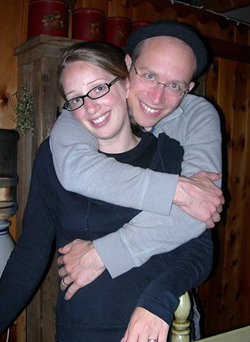
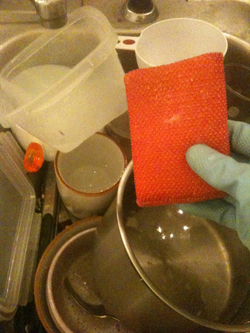
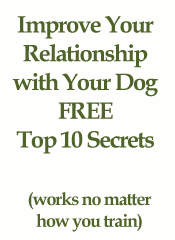
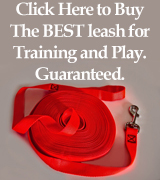
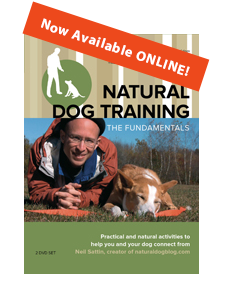

Very good comparison. Natural dog training is all about improving the bond between owner and dog. Using the same concept would work wonders on any relationship. And at least with our human relationships we have the ability to discuss what we actually want and need and what the other person wants. It's pretty sad that most of us fail to even begin these conversations!
I think if everyone perfected this with people they would need a lot less help with their dogs. Stopped by via That Mutt to say hello and also tell you that I enjoyed more than one of your recent interviews and thanks for the help.
Hi Susan,
Great to hear from you. It's my pleasure to be of service. Please keep me posted on your progress!
I would agree that applying those three principles can't help but improve relationships, with both our two legged partners and our 4 legged ones. They are good reminders for all of us.
I love this concept, especially the third concept (dog is always right). Seems many problems go away if we give read actions and words charitably instead of always assuming the worst.
Thanks for this post Neil. It highlights two principles I consider vital for improving both intra- and inter-species relationships - empathy and communication using "the other's" language. Any time we face the challenge of improving our relationship with one species we have an opportunity to Expand ourselves in all our relationships methinks.
Regards,
Smiles...
Hi
I feel the system that Neil uses has a lot of meret.
The training using pushing gives the dog a new understanding of what the relationship can be and continued practice will make a stronger bond.
Thanks Robert